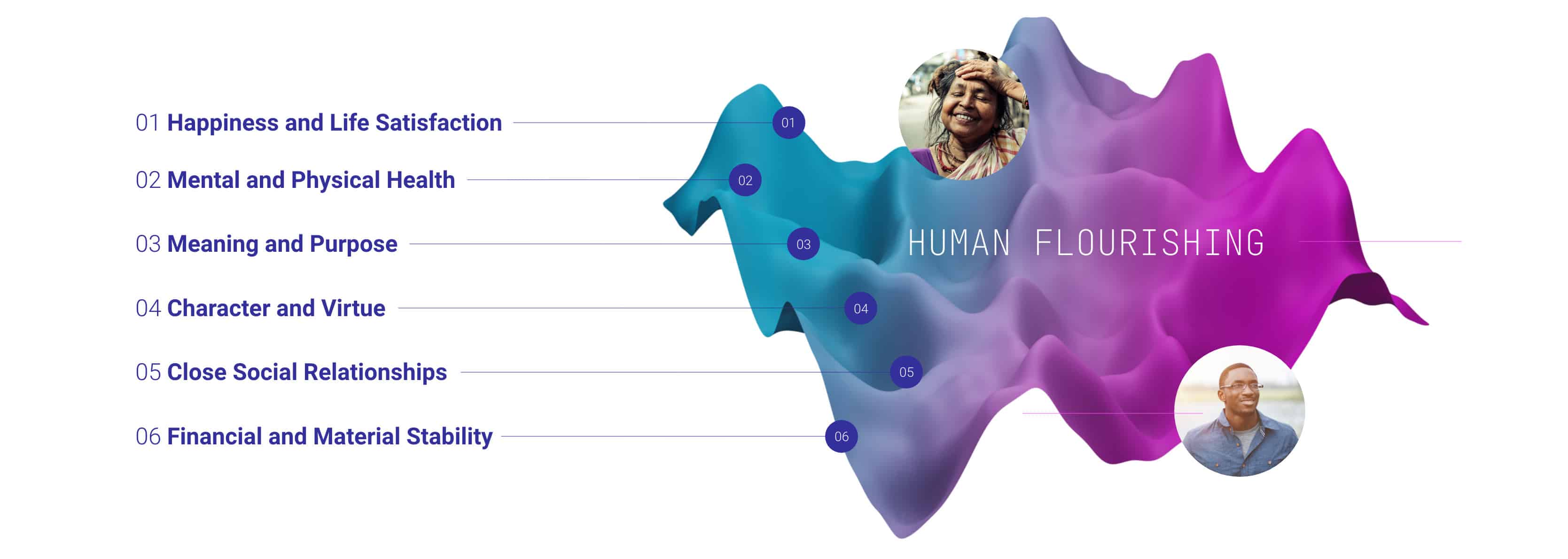What if we had insights into some of the biggest questions about the human condition?
What if there were less despair and more flourishing in our world today?
What if scientific research could help unlock the secrets of human flourishing?
From explorations that look inward at the smallest bits of human cells to those that peer out into the cosmos, we live in a time of stunning discoveries.
Yet, science has barely begun to scratch the surface of a fundamental mystery of human existence: How is it possible for some people to flourish? What makes the difference?
Ideas about flourishing abound. Aristotle considered it the highest good of human endeavors. In today’s “feel good” pop culture, flourishing is often associated with experiences of pleasure, one after another.
Notably, the world’s major religions all share a concern for human flourishing. Buddhist traditions teach the principle of ahimsa — promoting peace and respect for the life of all beings, animals as well as humans. In Judaism, the concept of shalom connotes a vision of the world in which blessing, peace, and healing abound. And in Christianity, the teachings of Jesus emphasize sacrificial and loving care for others as the pathway to makarios, meaning blessedness or flourishing.
Although the desire for flourishing seems widespread, there’s little consensus about what it is or how to attain it. Rigorous research-based evidence is still in too short supply.

Is flourishing a universal desire and what aspects are most important? To what extent do factors such as personality, government, demographics, or religion influence bring about flourishing? Is technology helping or hindering our ability to flourish? Can flourishing happen apart from community? Can it be meaningfully defined and measured globally in ways that matter to each culture and, at the same time, to our world as a whole?
How might we begin to unravel the complexity of what we don’t yet know? And what difference could a deep understanding of flourishing make in our world that’s currently so marked by profound differences and upheavals?
A wealth of discovery is waiting. With the launch of the Global Flourishing Study, a groundbreaking examination is underway.
The Global Flourishing Study results from a collaboration between the Human Flourishing Program at Harvard University, Baylor University’s Institute for Studies of Religion, the Center for Open Science, and Gallup, the worldwide authority on public polling. Spanning the disciplines of sociology, psychology, epidemiology, economics, history, philosophy, and theology, a team of more than 40 researchers will yield the largest and one of the most comprehensive studies of human existence ever undertaken.
It’s a $43.4 million, five-year study of 200,000 individuals in 20+ geographically and culturally diverse populations across the globe.
What’s more, it isn’t gathering data from its participants just once. Instead, it’s following the same people as they go about their lives over five years. The result will be longitudinal data that can open opportunities to analyze and understand the causes – not just correlations – of flourishing more deeply than ever before.
The most pointed look at human flourishing yet, it’s attempting to map the topography of the human spirit perhaps vaguely analogous to how science has cracked the DNA code. The data collected will be an open-access resource for researchers, journalists, policymakers, and educators worldwide.
“On a project of this scale, it is critical that the data be available to a broad audience in a way that it is transparent, ethical, and reproducible,” notes project co-director Dr. Byron Johnson, a social sciences professor and director of the Institute for Studies of Religion at Baylor.
The Global Flourishing Study is grounded in a broadly inclusive understanding of what it means to flourish. In-depth, the researchers are measuring human flourishing in six areas:
And numerous other aspects of flourishing will be examined as well. Working in collaboration over several years, the team developed a questionnaire to be administered online, over the phone, or in person, depending on participants’ circumstances. It consists of more than 100 extensively evaluated and pretested questions, ensuring that the data produced will meet the highest standards for relevance and reliability. The entire questionnaire will be readministered annually to the same people over five years.
The questions span wide-ranging aspects of participants’ lives. General happiness and well-being. Health and personal habits. Relationships and community. Personality and character. Education and employment. Financial well-being. Religiosity or spirituality. Demographic information. And more.
“Humans are complex beings. And flourishing is a tapestry woven by a harmony of diverse threads. By pairing experts and topics, we hope to offer unique insight into the particulars of the human experience,” says Tyler VanderWeele, Director of the Human Flourishing Program at Harvard.
“The Global Flourishing Study expands our knowledge of the distribution and determinants of well-being, effectively creating an epidemiology of flourishing and thus providing foundational knowledge for the promotion of flourishing,” said VanderWeele. “We believe understanding human flourishing can fundamentally change the way we live and how we interact.”
KEY FINDINGS FROM THIS INAUGURAL WAVE INCLUDE:
What possibilities might open when human flourishing is more deeply and broadly understood?
With extensive resources behind it and an array of leading thinkers involved, the Global Flourishing Study is unlocking the possibility of progress on multiple fronts.

Might better governments and policies result? Might families become stronger and parenting and education more effective? Would businesses get better at attracting and retaining employees? Might communities experience less crime? Could faith play a more intimate and active role in more people’s lives?
This project relies on science as a problem-solving endeavor. By taking the most in-depth look at flourishing ever and creating an extensive new open-data resource, it’s supporting diverse research and collaborations that can accelerate and amplify the important outcomes likely to result.

